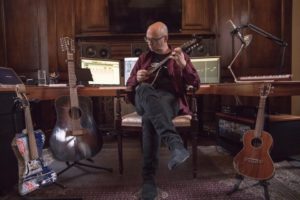Although many of my current friends are not aware of my musical background, I acknowledge that having the opportunity to interview a musician and/or a composer draws out my inner “music geek.” From the moment my daughter and I viewed the pilot of Freeform’s hit series Siren, we were both fascinated by the special effects, the acting, the story, as well as the vibrant, haunting music. Almost by chance, I noticed that Michael A. Levine was the composer of the music for this dynamic new show, and when he agreed to answer a few questions for me about his career, I was ecstatic!
RH: Please tell us about your musical background and how you happened to get involved in composing music for film/TV.
ML: I started on piano at four, violin at eight, guitar, harmonica, a few other bits later. First record placement as a songwriter at age sixteen (A B-side on a Canadian pop singer’s single). After blowing my final exam in Computer Science because my band had a road gig, I realized I should probably go to music school instead.
I played in every kind of club band from country to Irish and performed as a violinist at Carnegie Hall. I became a session player who doubles violin and electronic keyboards at a time when that was really weird. I guess it still is.
I can claim O.G. cred because I played on a Grandmaster Flash album in 1985 but I also worked on jazz albums for Carla Bley and pop stuff for Marianne Faithfull, Lenny Kravitz, Cher, and a bunch more. Then I started writing music for advertising which I still believe was my real music school.
I understand you composed a certain commercial jingle that most people would know (though I’m not sure anymore). Please tell us the story behind composing that jingle.
I’m guessing you are referring to the “Kit Kat Gimme A Break jingle,” composed in an elevator on my way from a meeting at DDB Needham with agency copywriter Ken Shuldman (who wrote the words) and music producer, Chris McHale. “Gimme A Break” was a kamikaze mission – the agency already knew it had something they wanted to sell the client and had spent lots of money on it. But they needed a throwaway “cannon fodder” campaign to give the client something to reject. Whoops!
What do you consider the highlights or what you are most known for in your movie/TV composer career?
I’m guessing that besides Kit Kat, people know my work for Cold Case, for writing the Spider Pig choir arrangement in The Simpsons Movie, producing Lorde’s cover of “Everybody Wants to Rule the World,” and the Resident Evil Biohazard theme song, “Go Tell Aunt Rhody.” I hope that the new television show I’m scoring, Siren, will be a big hit and become my new signature credit.
I did read something about you being the Governor of the Television Academy (Emmys) Music peer group. What can you tell us about your accomplishments/work in that capacity?
I was a governor for five years. We produced two fabulous concerts. The first was called “Score!” that had many of the top TV composers involved – Bear McCreary was attacked by zombies during the performance of his Walking Dead score and carried off screaming. Later I produced “Words + Music” with my fellow Governor Rickey Minor, which focused more on great songs from television. I am very proud that I spearheaded the drive to allow music supervisors to join the Academy and, later, to get them their first Emmy.
However, if I had to point to one thing it is this: when I joined the Music Executive Committee, of the twelve people on it, every one was a white male. To my knowledge, it always had been thus. By the time I left, that had changed dramatically: the executive committee was nearly half black or Latino and a quarter women. We had finally joined the twenty-first century,
I originally reached out to you because you are the composer of the music for Freeform’s new hit series Siren. How did this particular job come about?
Cole Porter was once asked what inspired him to write a song. He replied, “A call from my agent.” This was a bit like that.
The music is exceptional in Siren. What did you use for inspiration for this music? Were there specific techniques that you used in your composition process?
Thanks. I was hired on the basis of a demo I wrote that featured references to traditional music of the sea. Some of that was shown at Comic-Con in New York. But the network felt it sounded too “Irish” and the score shifted to a more electronic palette. If you listen closely, though, you can still hear the sea shanty DNA in the music.
Any other upcoming works you can mention?
I have an album coming out at the end of May that features percussionist virtuoso Evelyn Glennie on mallets and me on electric violin. It’s called “Double Crossings” – kind of a mallet players joke – and we recorded it at Abbey Road studios in London. Besides being one of the world’s top percussionists, Evelyn has become a heroine for the disabled because she is deaf. The fascinating thing is that her deafness was almost irrelevant to our process.
I also scored a movie called The 3100: Run and Become, a documentary about the longest footrace in the world. I also wrote the closing credits song “Running” which we were fortunate enough to get the legendary Roberta Flack to sing. The film begins to make the festival rounds soon.
As a musician myself, I am most interested in how composers go about composing music for movies and TV as I would tend to think that can be a challenge. Is there a process or a procedure you go about when composing music like this?
It all boils down to story. I usually begin where the story takes its most crucial turn, often near the end.
While this might be a silly question, what is the difference between composer, music department, and soundtrack?
The way IMDB {Internet Movie Database} defines it, Composer is a title given to the person who composed the score, Music Department includes all the other musical participants, including music supervisors, music editors, players, contractors, etc. Soundtrack is a recording, sometimes including score, sometimes including licensed songs.
I noticed actor and producer on your resume as well. Can you tell us a little bit about that as well?
Actor has only been as an on-screen musician – I am not trying to get George Clooney’s next gig! An example is in the bar scene in the second Pirates movie – I am playing the fiddle. Besides the fighting that occurs on-screen, everyone off-screen was throwing food. A piece of bread actually got lodged under the strings of my instrument! Fortunately, it was just a prop!
As a producer, I have a few projects underway that, should they come to fruition, you will hear all about.
Do you have a favorite genre to write? To listen to? To play?
I am by nature interested in a lot of different things. In fact, I have a business card that, where it should say “composer”, says “pathological eclecticist.” Someone once asked photographer great Annie Liebowitz which camera she preferred. She replied, “The one in my hand.”
I think I am a bit the same way about music.
It is safe to state that Michael is one of the most eloquent and engaging composers with whom I have interacted in the entertainment business. While it is self-evident that music is his true passion and calling, he has demonstrated his pragmatism and leadership abilities throughout his career in a variety of functions. As a creative who has witnessed welcome changes throughout his career, he readily treasures each and every opportunity that is afforded to him. His candor and sense of humor are two traits I greatly admire, and I applaud his dedication to the craft while not permitting his adoration and appreciation of the whole of the musical world to diminish. In many ways, I believe it is his singularity and his own indomitable approach that set his music apart from other mediocre musicians who have not yet determined their individual style. Michael is certainly unique in every aspect of his life and career, and I believe therein lies the success which he eagerly relishes.
Therefore, if you are not watching Siren every Thursday night on Freeform (or streaming it on Hulu or elsewhere), I will calmly inquire, “What on earth is wrong with you??!” (Just kidding? But seriously, it is an amazing show!) I would invite all of my readers to watch this show and luxuriate in the masterful music composed by one Michael A. Levine. Additionally, if you can find it in your heart to visit all his links below and follow him where applicable, I know that his gratitude would be endless to say the least. At this point, we don’t know if a season two of Siren is “in the bag” so to speak, but regardless, I salute Michael and the entire cast and crew for a phenomenal show that can be savored on so many levels. And by the way, if you have not listened to the music which permeates the show Siren, I would invite you to do so as soon as possible while investigating and enjoying the rest of Michael’s music as well. While I was unfamiliar with Michael and his capabilities before this show’s premiere, I am grateful that I am now cognizant of his profound and indisputable talent, and I look forward to many more works from this gifted artist in the future!
FOLLOW MICHAEL









